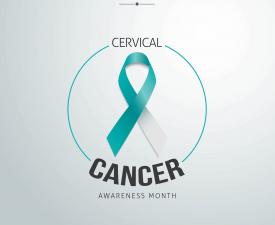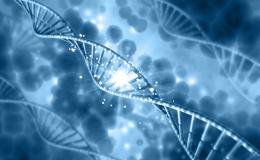Is Cervical Cancer Hereditary?
January 5, 2021
Cervical cancer is cancer that starts in the cervix, or the lower part of a woman’s uterus. Years ago, cervical cancer used to be one of the most common causes of cancer death in women in the United States.

The advent of the screening Pap test, which detects changes in cervical cells, caused a significant decrease in the cervical cancer death rate by detecting the disease at earlier and more treatable stages. And while it is clear that there are strong risk factors associated with cervical cancer, it is less clear whether or not the disease has a genetic link. In recognition of Cervical Cancer Awareness Month this January, we take a closer look at whether or not cervical cancer is hereditary and what actions you can take if you suspect the disease runs in your family.
Hereditary cancers are syndromes caused by an adverse mutation, or change, in a gene that plays a role in controlling cell growth and division. Hereditary cancer syndromes can be passed from an affected parent to their child, increasing an affected child’s chances of developing certain types of cancer. A relatively small percentage of cancer diagnoses, typically around five to ten percent, are thought to be caused by an inherited gene mutation. Other cancers are considered sporadic forms of the disease, where the gene mutations responsible for a cancer are acquired and not inherited.
The vast majority of cervical cancer cases are caused by infection with certain high-risk strains of human papillomavirus, or HPV. The association between high-risk HPV strains and cervical cancer is so high, in fact, that an additional HPV infection screening test has been approved to monitor cervical cancer risk. To date, no gene mutations have been associated with an increased risk of developing cervical cancer, but the disease may run in some families. Currently, researchers speculate that inherited mutations in genes related to the clearing of HPV infection may cause women in some families to be more susceptible to persistent HPV infection, increasing their risk of developing cervical cancer. Additionally, women in the same family may share non-genetic risk factors that may increase their likelihood of developing the disease.1
If cervical cancer has occurred in multiple generations of your family, and particularly on one side, you should talk to your doctor about your risk factors and family history for an accurate &risk assessment. While it may be unclear whether or not the cancer diagnoses in your family are due to genetic or non-genetic factors, the Pap and HPV infection screening tests can accurately assess your current cervical cancer risk without any prior knowledge of your risk factors for the disease.
Researchers may eventually discover specific genetic risk factors for cervical cancer that can be screened by hereditary cancer tests. Comprehensive hereditary cancer screenings available today can screen an entire panel of genes for mutations associated with cancer syndromes, allowing healthcare providers to tailor disease screenings based on their patient’s specific risks. The Kailos Genetics ExpedioTM Hereditary Cancer Screening test screens 33 hereditary cancer genes for mutations associated with a variety of different cancers. Click here to learn more about ExpedioTM or contact us with any questions you may have regarding our genetic screening services.




